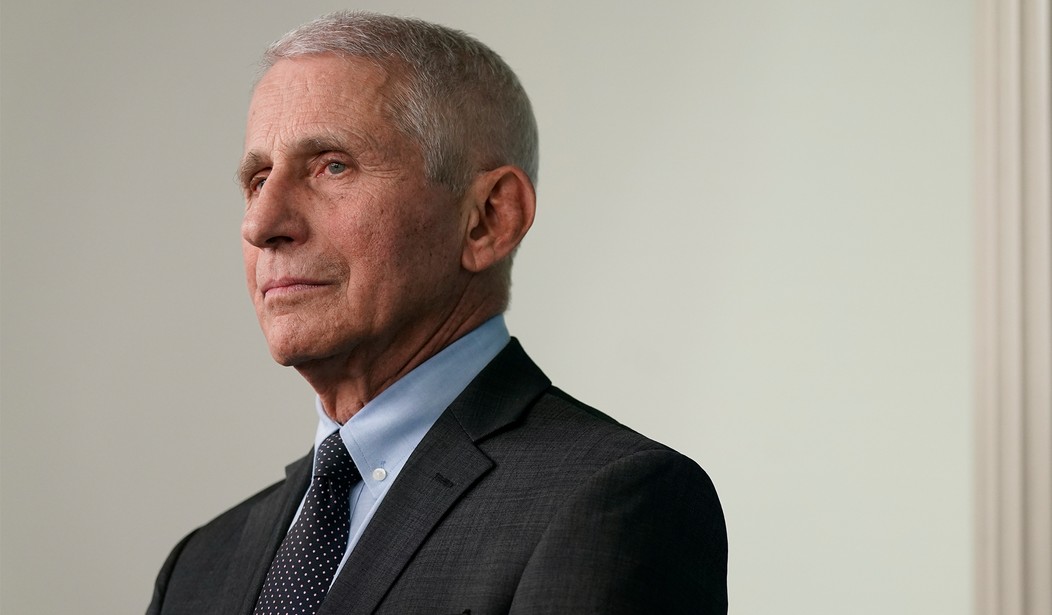If you thought the 82-year-old Dr. Anthony Fauci was going to just merely retire, think again. He announced last August that he was stepping down from his position as the director of the National Institute of Allergy and Infection Diseases (NIAID), effective several months later, which he said was "to pursue the next chapter of my career," though he would still collect a an exorbitant pension. We now know what that will entail.
Earlier on Monday, Georgetown University announced that Fauci will join the faculty for their medical school as a Distinguished University Professor in the School of Medicine’s Department of Medicine in the Division of Infectious Diseases. He will also hold an appointment at the McCourt School of Public Policy. He'll start his position on July 1, less than a week away.
Dr. Anthony Fauci will serve as a Distinguished University Professor in @GUMedicine's Department of Medicine in the Division of Infectious Diseases, starting July 1. He will also hold an additional appointment in the university’s @McCourtSchool. https://t.co/gUINd8TYfi
— Georgetown University (@Georgetown) June 26, 2023
With regards to that "next chapter" for Fauci, a press release from the university frames it as the polarizing figure "continuing to advance public health and mentoring and inspiring the next generation of leaders in science, health care and public service."
The press release is equally as glowing throughout, including with statements and a lengthy explainer on how Fauci received a Jesuit education, and how he and his wife were married at the university's Dahlgren Chapel. Fauci is also quoted as calling the decision to come to Georgetown a "no-brainer."
"We are deeply honored to welcome Dr. Anthony S. Fauci, a dedicated public servant, humanitarian and visionary global health leader, to Georgetown," Georgetown President John J. DeGioia is quoted as saying. "Dr. Fauci has embodied the Jesuit value of being in service to others throughout his career, and we are grateful to have his expertise, strong leadership and commitment to guiding the next generation of leaders to meet the pressing issues of our time."
Recommended
One glowing statement that sticks out in particular comes from Maria Cancian, dean of the McCourt School of Public Policy. "Through his extraordinary leadership and example, Anthony S. Fauci leveraged his role at the National Institutes of Health to influence not only medicine but policy, saving countless lives around the world as a result," she said. "We are honored to have such a distinguished practitioner, one who faced and navigated some of the world’s most pressing issues, to guide our students in becoming transformative global leaders."
For all the praise heaped upon Fauci, here's no mention of holding him accountable, or that members of Congress, chief among them Sen. Rand Paul (R-KY), also a physician, have taken issue with his testimony. The pandemic brought on lockdowns and school closures, the effects that are still being felt today, especially when it comes to lower test scores.
Fauci has continuously dodged responsibility on those school closures, and gave chilling responses when asked about the lengths the Chinese Communist Party (CCP) turned to as part of their "zero COVID" policy.
Fauci also has promoted the idea of gain-of-function despite the risks. Now Fauci is being heaped with praise for how he handled the pandemic.
In the midst of all of this has been emails unearthed in June 2021 showing how much more Fauci knew than he let on. Months, and even years, later now, documents continue to cast Fauci in a problematic light.
Despite such a problematic legacy for his handling of COVID, Fauci claimed to The Washington Post "I really can’t see something that I would do completely over."
As more information comes forth, it's becoming increasingly more obvious that the virus came from a lab leak, as opposed to the Wuhan wet market. Focusing on the wet market narrative is one more role that Fauci looked to have played, though, even turning to censorship to do so.
Among the "Related Content" to do with the announcement is a write-up of "5 Lessons Dr. Fauci Learned From the COVID-19 Pandemic," from March 29 of this year. None of those five lessons highlighted appear to have amounted to Fauci discussing owning up to being wrong or anything about accountability.

























Join the conversation as a VIP Member